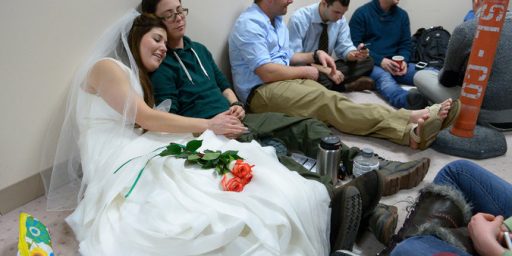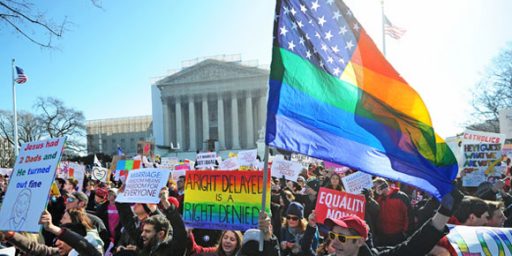Virginia Marriage Case Headed To Supreme Court
Not surprisingly, one of the Defendants in the challenge to Virginia’s same-sex marriage ban has announced their intention to appeal the 4th Circuit’s decision striking down the law to the Supreme Court:
In Virginia, Michele B. McQuigg, who is the county clerk of Prince William County, a jurisdiction just south of Washington, D.C., asked the U.S. Court of Appeals for the Fourth Circuit to delay its July 28 decision striking down the Virginia ban on same-sex marriages. She asked for a ninety-day delay to allow her to file a petition for review in the Supreme Court, which she said her lawyers would file by October 26.
Unlike most other states involved in court battles over same-sex marriage, Virginia allows its county clerks — the officers who issue marriage licenses — to be in court to defend the state ban. In other states where a defense has been mounted behind such a prohibition, state officials have done so.
The Utah and Virginia cases may not be the last of the same-sex marriage cases that could reach the Court during its coming Term, because other cases are proceeding on expedited schedules in other federal courts of appeals. The Court will have complete discretion whether to take on any of the cases, and on which one or more it might choose for reviewing the constitutional questions.
The Virginia case raises both of the issues that have arisen over same-sex marriages in the past year: state power to forbid gays and lesbians to marry anew, and state power to refuse to recognize such marriages that have been performed legally in other states.
McQuigg is one of two county clerks in Virginia who have come to the defense of the state ban. They took over the defense when state officials decided that they would no longer support the constitutional amendment and state laws that outlaw same-sex marriage altogether.
In addition to the Utah and Virginia cases, it’s likely that the Oklahoma case, in which the 10th Circuit struck down that state’s marriage ban last month, will get to the Supreme Court before the Justices return from their summer break. If the Court does agree to take up the issue next term, the most likely outcome is that we will see all three cases consolidated for that purpose. In the meantime, the cases still pending in the lower Federal Courts will likely be stayed pending the Supreme Court’s decision.





Isn’t the question, as you say, whether the Supreme Court will hear the case?
I wonder if the Court will simply ignore this for lack of standing.
Neil Siegel has a good take on this:
— http://balkin.blogspot.com/2014/08/halbig-king-and-procedural-path-ahead.html
“That makes it 4th and 5, Phil. I expect Coach Roberts will send the punting unit onto the field here…”